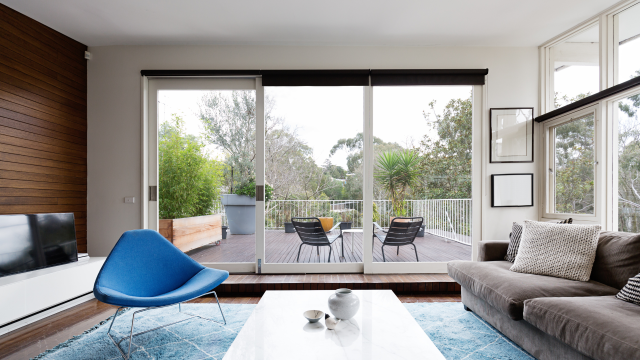The next boom in smart technology products is focused on builders and new construction. It was only a matter of time, but smart doors and windows are now a reality. Previously, windows and doors presented a challenge in the smart home. Sure, you could have a smart lock and window and door sensors, but actually opening and closing—that was left to smart garage doors alone. But recently, Marvin, a longtime manufacturer of traditional doors and windows, announced they were expanding their line into smart products. They join Masonite, another legacy door builder that has, until now, had the only smart door on the market.
Smart front doors are already here
Masonite released the M-PWR smart front door last year—you can order one from Home Depot. It connects to house power, so it’s most likely to be part of a new build, and it comes with a Ring doorbell and smart Yale lock pre-installed. Since it’s connected to power, you’ll never run out of battery juice on any of the parts and ,according to Masonite, you can simply connect it to a light source or plug nearby. The doors are fiberglass, and have other smart functionality baked in, like motion activated lights. Prices start around $US3,500 and climb to over $US6,500 depending on your configuration. Another issue? You’ve got to deal with multiple apps to control the door. One app opens and closes it, another unlocks it and a third runs the video doorbell. When I inquired in November about using Matter to create a more seamless experience, Masonite said there were no current plans, but they hoped to better integrate the experience in the future. While an incredibly exciting concept, it’s a lot of money for what seems like a very early stage product. I’d also be concerned about the technology of the lock and doorbell aging out: How hard will it be to replace these parts?
Smart windows and patio doors are coming
Marvin is primarily a window company, so their focus is on a variety of window options. While your standard double- or single-hung windows aren’t represented, casement and awning windows are, which make sense if you think of how they articulate. Also interesting is a skylight, which feels like the most useful product. Imagine a skylight that closes when it begins to rain, or opens when humidity in the house reaches a threshold so the house can vent. But the showstopper is a giant automated folding glass door. No pricing or availability details have been released, but you have to imagine they’re a premium product.
Usually, we talk about smart home technology in terms of the convenience and cool factor, but that conversation leaves out a very important feature of smart tech: accessibility. While it’s certainly easier to have doors that open and close for you when holding groceries, and windows that can respond to temperature shifts or danger, in truth what these advancements offer is the ability for people to live independently—if they can afford the expense of such products. In a world that is going to support more aging populations, being able to operate the basic parts of your home using only your voice or phone is a big deal.
The trouble with the premise is that these products will likely add to the already skyrocketing costs of new construction, which means the people who might benefit the most from them will be the least likely to obtain them.

Leave a Reply
You must be logged in to post a comment.